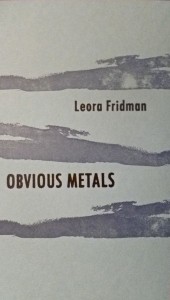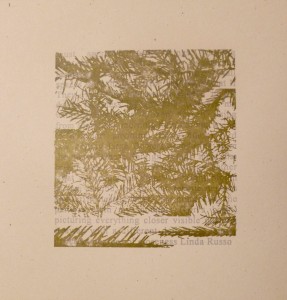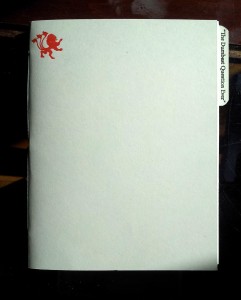This article can also be found by way of our cosponsor, Poetry Society of America, in their .
Stephanie Anderson on Projective Industries
Stephanie Anderson is the author of In the Key of Those Who Can No Longer Organize Their Environments (Horse Less Press) and several chapbooks, including the forthcoming Sentence, Signal, Stain (Greying Ghost) and LIGHTBOX (The New Megaphone). She edits and currently lives in Tokyo.What is your own personal history with chapbooks? How did they first catch your interest?
The first chapbook I can remember seeing was Genya Turovskaya’s Calendar (Ugly Duckling Presse), in 2003, at City Lights. I was alone upstairs, and I think I sat down on the floor and read it there in the bookstore. I thought it was the most beautiful book I’d ever seen. But after that, my history with chapbooks begins in a desire for publication. In 2006, having seen very few examples of chapbooks, I submitted to and won the New Michigan Press/DIAGRAM chapbook contest. I had read and admired some of their first chapbooks—particularly Joshua Marie Wilkinson’s A Ghost as King of the Rabbits and Rachel Moritz’s The Winchester Monologues.What made you first decide to start publishing chapbooks?Ander Monson was such an amazing editor, and the publishing process felt really collaborative in ways I hadn’t known it could be. I started to pay attention to chapbooks, and I toyed with the idea of creating a press that was based in collaboration, but I couldn’t really get anything off the ground. Then in 2008 when we were leaving New York (for two different cities!), the poet Sam Amadon and I decided to start Projective Industries. Sam had published in the first set of Octopus chapbooks, and we were both so excited about the form — though for different reasons perhaps (I really wanted to make things). The press probably also felt like a way of staying connected to the New York creative community that we were now leaving.
Could you talk a little bit about your own process of making and publishing chapbooks?
For the first three years or so, we used a standard size, base set of materials, and format; we wanted Projective Industries chapbooks to be immediately recognizable—almost “branded.” But I had taken the letterpress introductory course for emerging writings at the New York Center for Book Arts, and kept hoping I’d run across an affordable letterpress. I finally did (thanks to the poet Adam Weg) and now the process is probably more labor-intensive but also domestic; we (Kate McIntyre and myself) print the covers if my dining room (after draping tarps over the furniture), we hope the cats don’t step in the ink, we give the authors a lot of cover design and paper and color choices. We have an open reading period, but because we basically fly under the radar, we usually “only” get 50-100 submissions, which feels manageable. Kate and I have both taken some additional letterpress training, but we definitely still have a lot to learn; the books clearly aren’t printed by masters, and I like how they feel homegrown and weedy to me.What is unique about the chapbook form, or why chapbooks and not book-books?
This is a question I’ve asked myself and other publishers a lot. Sometimes I think it has to do with the rise of the poetic sequence or serial poem; other times I think it’s about economics and the rise of MFA programs and the desire for “community.” I don’t want to fetishize the book object, but the idea I keep returning to is the limited production run and potential uniqueness of each book. Chapbook distribution doesn’t operate in the same way that book distribution does; it’s a return to previous forms of publishing (like ’60s mimeo mags) but it’s also a looking forward. In other words, the proliferation of chapbooks and chapbook presses has started to really influence the way “book books” are produced and perceived and distributed, and that’s super exciting.
Do you have recent favorite chapbook from another press?Stephanie Blazer’s Wed Jan 30 12:58:10 2013—Thu Dec 20 14:16:36 2012 (Flying Guillotine) really knocked my socks off. It’s an elegy via tweets, in reversed chronology, and it shows how perfectly chapbooks can foreground and frame issues of mediation and media.
Visit the Projective Industries site , and visit them at the NYC/CUNY Chapbook Festival on on Thursday, April 3 from 10AM – 8PM at The Graduate Center, CUNY.





